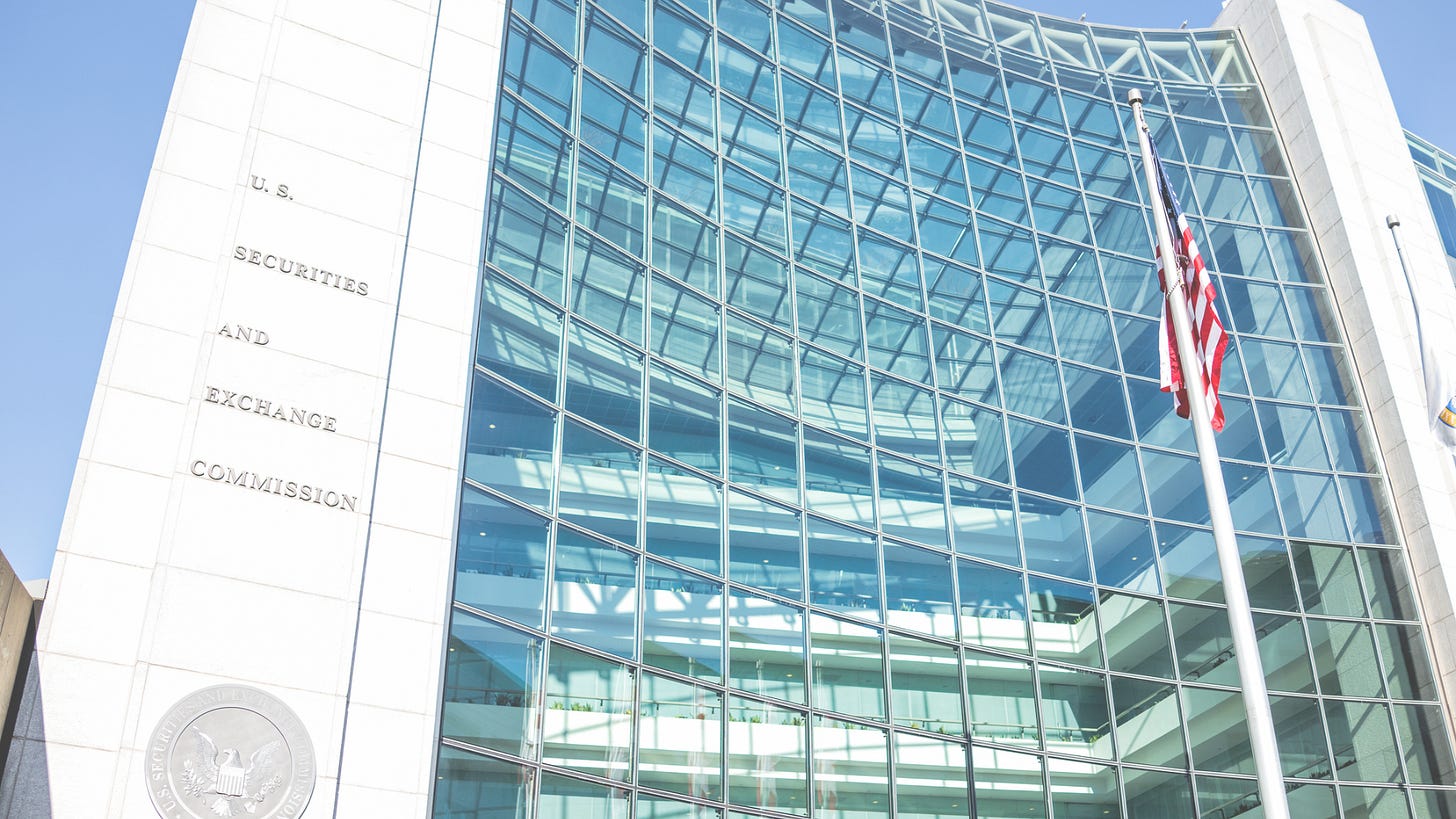The top five climate risk stories this week
1) Republicans blast ESG fund rules

Proposed rules that would force US investment funds to disclose ESG-related data and publish their emissions are “illegal and misguided,” Republican state attorneys general say.
In a letter sent Tuesday to the Securities and Exchange Commission (SEC), the attorney general of West Virginia, Patrick Morrisey, together with 20 of his red state peers argued that the agency was seeking “to transform itself from the federal regulator of securities into the regulator of broader social ills” through its proposal to mandate enhanced ESG disclosures from investment companies.
The SEC released the draft rule for public comment on May 25. If enacted, it would sort ESG investment funds across three categories, each with their own specific disclosure requirements. “Integration funds”, which incorporate ESG factors alongside non-ESG factors, would have to report how they embed ESG factors in their investment processes. “ESG-focused funds”, which foreground ESG in their investment decision-making, would have to produce a standardized ESG strategy overview table. Finally, “Impact funds”, which are oriented toward specific ESG goals, would have to disclose how they measure progress toward their impact objectives. In addition, “ESG-focused funds” that incorporate environmental factors would have to calculate and disclose the carbon footprint and weighted average carbon intensity of their portfolios.
The attorneys general claim that the SEC lacks the authority to enact the proposed rule, since Congress did not give it the power “to mandate disclosures on anything it wants to for any reason.” They also argue that the proposal would unjustly compel the disclosure of information that is not material to the decision-making process of the everyday investor.
The SEC rule itself argues that making funds disclose enhanced information is within the agency’s statutory authority. Commissioner Caroline Crenshaw, speaking when the proposal was first released, said that the proposal “fits within the Commission’s long-standing and well-established framework of requiring disclosure of material information to investors for decision-making. For example, funds have long been required to provide important information about a fund’s fundamental characteristics including investment objectives, strategies, risks and governance; and, registered advisers are required to provide key information about their methods of analysis and investment strategies.”
2) Dutch bank downgrades farm loans as transition risk bites

Rabobank, the Netherlands’ second-largest lender, slashed the creditworthiness of a €10.3 billion loan portfolio in reaction to the Dutch government’s greenhouse gas emissions plan.
In its mid-year financial disclosure, Rabobank said it had classified all its Dutch dairy farm loans as “stage 2” exposures under the International Financial Reporting Standard 9 accounting framework, meaning the bank considers them to have significantly increased in credit risk.
The decision followed the June release of the Dutch government’s climate plan for the agricultural sector, which aims to sharply reduce the release of nitrous oxide — a potent greenhouse gas emitted by livestock. Rabobank said the “current uncertainty and lack of clarity” in terms of how the plan will affect Dutch farms meant it was prudent to label the portfolio as “vulnerable.” In addition, Rabobank applied a “Top Level Adjustment” of €76 million to its loan-loss reserves to account for its increased riskiness.
“The government’s nitrogen reduction plans are expected to have a significant impact on the business model of our clients, though substantial government support is made available,” the report said. “The overall transition risks for affected sectors are being further investigated. Our account managers are in strategic dialogues with our clients about their financing requests at hand, and about maintaining a future-proof business.”
3) Net-zero shift could imperil sovereign bonds — MSCI

Climate transition risk could play havoc with sovereign bond yields, research from financial intelligence company MSCI shows.
The firm used climate scenarios to estimate how net-zero target-setting and climate policies could influence factors like a country’s gross domestic product, inflation, and interest rates. Changes to these factors were then translated into shocks to government bond yields. Bond yields move inversely to prices.
The analysis found that transition risk-related yield shocks could be substantial, and could vary wildly by the maturity of each bond as well as the country of origin. For example, US 5yr yields could spike by 90 basis points (bp) under a Net-Zero by 2050 scenario versus the baseline. In contrast, 20yr yields would see the largest shock — around 80bp in size — under a Divergent Net-Zero scenario. The smallest shocks were linked to the least ambitious climate scenarios, which do not assume radical policies are introduced.
“Yield increases are not solely driven by size of the decarbonization journey; what matters too is how quickly that change influences macroeconomic variables, such as inflation, within that country,” the paper says.
MSCI also found that sovereign bonds are vulnerable to “greenflation”: the potential increase in prices the climate transition could bring about as companies and households adapt to heightened emissions costs and temporary shortages in the availability of clean energy. This “greenflation” could spur central banks to hike interest rates, which in turn would erode the performance of sovereign bonds, which pay fixed rate cashflows.
4) Private managers falling short on climate data

Funds managing private assets are ill-equipped to meet asset owners’ demands for data and metrics on their climate performance, a survey by UK consultancy Hymans Robertson shows.
Pension funds and other asset owners typically allocate a fraction of their portfolios to non-publicly traded assets, such as private debt, private equity, real estate, and infrastructure. To complete their climate reporting obligations, asset owners need to know the emissions produced by these private assets, as well as the climate risks they are exposed to. However, Hymans Robertson’s research suggests that many private asset managers are not providing this information.
Of 59 managers surveyed, 44% did not respond when asked to confirm they had climate data available. About two-fifths said they provided data for all the funds they manage, and 14% that they have data for some of their funds. Private debt managers were the least responsive — only four out of 20 managers responded to the survey, and none of these said they provided emissions data to their clients. Of the private equity managers surveyed, 43% provided fund-level climate data and 9% emissions data. The corresponding figures for property managers were 60% and 44%, and for infrastructure funds 76% and 48%.
“The need for asset owners to assess climate risks and report on carbon emissions has been well signposted which has, in turn, created an expectation that asset managers will be able to provide this data,” said Simon Jones, Head of Responsible Investment at Hymans Robertson. “We know there will not be a short quick fix, but all organisations need to recognise the importance of this issue,” he added.
5) Many EU green funds mislabeled — Morningstar

Almost one-quarter of “light green” funds in the European Union don’t adhere to ESG-related investing principles, research firm Morningstar claims.
Under the bloc’s Sustainable Finance Disclosure Regulation, environmentally-friendly funds are sorted into one of two categories: “Article 8” (or “light green”) funds are those that promote sustainability objectives, while “Article 9” (or “dark green”) funds explicitly pursue measurable ESG targets.
Morningstar ESG analyst Boya Wang said in an interview that 23% of “light green” funds would not qualify as sustainable under the company’s framework. Morningstar does not assign an ESG label to funds that only exclude vice assets, like tobacco, oil, and weapons. The company estimates that as of June, “light green” funds held €3.76 trillion in assets, and “dark green” funds €420 billion.
Investment flow data from Morningstar also shows that investors stampeded out of “light green” funds between January and the end of July, taking out €47.1 billion as markets whipsawed in the wake of Russia’s invasion of Ukraine. In contrast, “dark green” funds raked in €25 billion over the same period.

